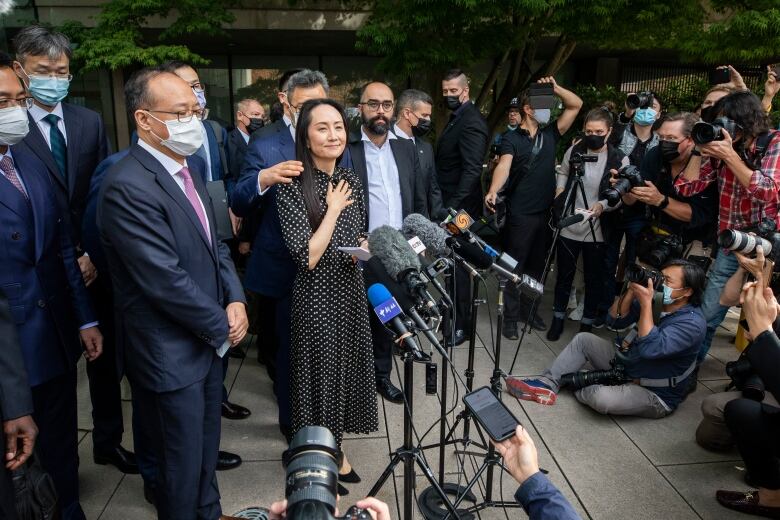China's foreign ministry says Michael Kovrig and Michael Spavor, who were allowed to return to Canada late last week after nearly three years in detention, were released on bail for health reasons.
A ministry spokesperson made the comments Monday as Beijing sought to downplay the connection between their release and the return to China of a long-detained executive of Huawei Technologies.
Spavor and Kovrig were detained in December 2018, days after Huawei's chief financial officer, Meng Wanzhou, was arrested in Canada at the request of U.S. authorities.
Many countries labelled China's action "hostage politics," while China accused Ottawa of arbitrary detention. The two Canadians were jailed for more than 1,000 days.
Meng fought the U.S. demand for extradition from Canada. She landed in China on Saturday after reaching a deal with the U.S. Justice Department that led to a prisoner swap.
"The case of Meng Wanzhou is completely different from that of Michael Kovrig and Michael Spavor in nature," foreign ministry spokeswoman Hua Chunying told reporters at a daily briefing on Monday.
The two men were suspected of endangering national security, Hua said.
No word on what health problems are
Spavor, an entrepreneur, had been sentenced to 11 years in prison, accused of spying. Kovrig had not yet been sentenced but was facing similar charges.
China released the two Canadians on bail after a "diagnosis by professional medical institutions, and with the guarantee of the Canadian ambassador to China," Hua said.
Hua did not answer questions from journalists about whether the prisoner releases were entirely unrelated and what the health reasons were.

When asked if China was making statements to save face, Canadian Foreign Affairs Minister Marc Garneau said he was "not going to predict why they would have made that statement."
"But I will agree with you that it is primarily for local consumption," he told CBC's Rosemary Barton Live on Sunday.
"I saw the two Michaels yesterday. They're in fine form."
Meng reached an agreement with U.S. federal prosecutors that will drop fraud charges against her next year. In return, she is accepting responsibility for misrepresenting the company's business dealings in Iran.
Her return to China was broadcast live on the country's central broadcaster, CCTV, as she wore a red dress the shade of China's flag and thanked the country's leader, Xi Jinping, and the ruling Communist Party.
On Monday, Hua said Meng was a victim of "political persecution" and was able to return to China thanks to the "government's unrelenting efforts."
In contrast, news about the release of the two Michaels was reported by the state-owned tabloid Global Times, and while the news spread online, it was not carried by more authoritative state media agencies like CCTV or Xinhua.
Huawei is the biggest global supplier of network gear for phone and internet companies. It has been a symbol of China's progress in becoming a technological world power — and a subject of U.S. security and law enforcement concerns.
Former president Donald Trump's administration cut off Huawei's access to U.S. components and technology, including Google's music and other smartphone services, and later barred vendors worldwide from using U.S. technology to produce components for Huawei.
WATCH | Kovrig, Spavor release linked to Meng Wanzhou plea deal, Ottawa says


















